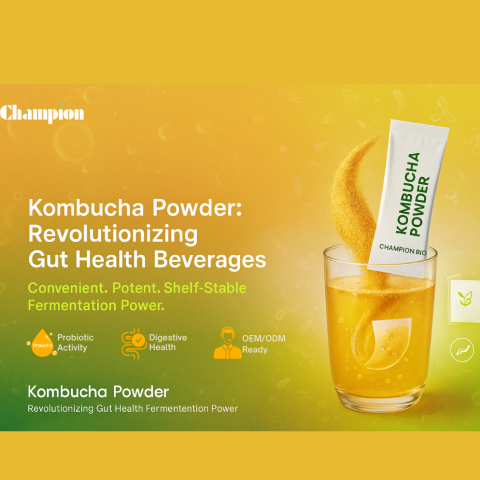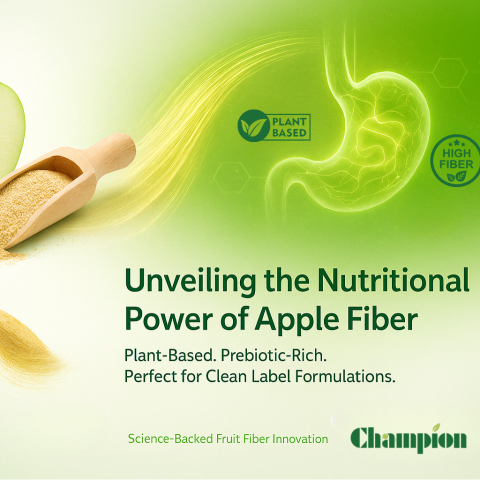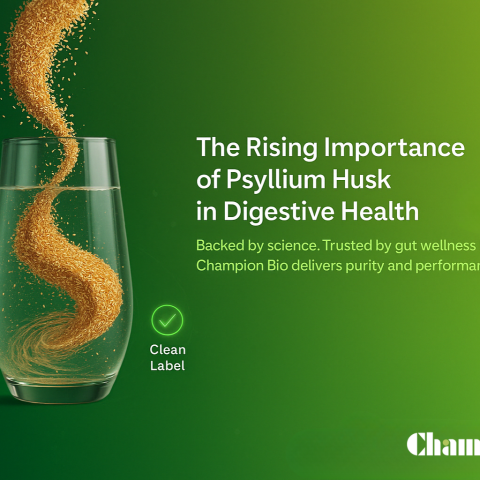Blog
18.Mar.2025
Yeast Protein – A Game-Changer for Functional Food Formulations
In the ever-evolving landscape of nutrition and wellness, the quest for sustainable, allergen-free, and nutritionally robust protein sources has led to the emergence of 酵母蛋白 (Yeast Protein) as a formidable contender. This versatile, plant-based protein alternative is rapidly gaining traction across various sectors, including sports nutrition, meal replacements, and functional foods. In this comprehensive exploration, we delve into the myriad benefits of yeast protein, its applications, and why it stands as a beacon of innovation for brands and manufacturers alike.
The Rise of Yeast Protein in Modern Nutrition
As consumers become increasingly health-conscious and environmentally aware, the demand for protein sources that align with these values has surged. Traditional animal-based proteins, while effective, often come with concerns regarding sustainability, allergens, and dietary restrictions. Plant-based proteins, though popular, may lack certain essential amino acids or present digestibility issues. Yeast protein emerges as a solution that bridges these gaps, offering a complete amino acid profile, high digestibility, and a minimal environmental footprint.
Nutritional Excellence: A Complete Amino Acid Profile
One of the standout features of yeast protein is its comprehensive amino acid profile. Unlike some plant-based proteins that may lack certain essential amino acids, yeast protein provides all nine essential amino acids necessary for human health. This completeness ensures that the body receives the building blocks required for muscle synthesis, repair, and overall metabolic functions. Notably, yeast protein is rich in B vitamins—such as B1, B3, B5, B6, B8, and B9—which are particularly challenging to obtain in vegan diets. It also boasts high levels of minerals like potassium, phosphorus, iron, zinc, and magnesium, contributing to its superior nutritional profile. Signicent LLPVitafoods Insights
Digestibility and Allergen-Friendly Properties
Digestibility is a crucial factor when considering protein sources, especially for individuals with sensitive digestive systems. Yeast protein scores favorably in this regard, with a digestibility score close to that of whey protein, making it easily absorbed by the body. Moreover, it is hypoallergenic, free from common allergens such as soy and dairy, thereby appealing to a broader audience, including those with food sensitivities.
Sustainability: A Green Protein Source
Environmental sustainability is at the forefront of global concerns, and the food industry plays a pivotal role in this narrative. Yeast protein production is remarkably sustainable, often derived from yeast cells cultivated from agricultural and food industry wastes. This method not only provides valuable nutrients but also enhances the purification of wastes, thereby reducing environmental impact. Additionally, yeast, as a single-cell organism, has a low carbon footprint and is infinitely available, making it a sustainable alternative to animal-derived proteins.
Versatility in Food Applications
The functional properties of yeast protein make it a versatile ingredient across various food applications:
In an era where consumers scrutinize product labels, the clean-label appeal of yeast protein cannot be overstated. Products formulated with yeast protein can eliminate unpopular E-numbers and artificial additives, aligning with the demand for transparency and natural ingredients.
Consumer Acceptance and Market Potential
Recent surveys indicate a growing consumer enthusiasm for yeast protein as a nutritious and sustainable alternative. For instance, a survey conducted by Revyve revealed positive attitudes toward yeast proteins among consumers in France, the UK, and Germany, highlighting its potential in shaping sustainable food formulations.
Conclusion: Embracing Yeast Protein for a Sustainable Future
The integration of yeast protein into food products represents a harmonious blend of nutrition, sustainability, and consumer appeal. Its comprehensive nutritional profile, coupled with environmental benefits and functional versatility, positions it as a protein source of the future. Brands and manufacturers have the opportunity to innovate and meet the evolving demands of consumers by embracing yeast protein in their product formulations.
Partner with Us
At Champion-Bio.com, we are committed to providing high-quality yeast protein solutions tailored to your brand's needs. Our expertise in ingredient sourcing and private-label manufacturing ensures that your products stand out in the competitive market. Contact us today to explore how we can collaborate to bring the next generation of plant-based products to life.
#YeastProtein #SustainableIngredients #FunctionalNutrition #B2BManufacturing #FoodInnovation
The Rise of Yeast Protein in Modern Nutrition
As consumers become increasingly health-conscious and environmentally aware, the demand for protein sources that align with these values has surged. Traditional animal-based proteins, while effective, often come with concerns regarding sustainability, allergens, and dietary restrictions. Plant-based proteins, though popular, may lack certain essential amino acids or present digestibility issues. Yeast protein emerges as a solution that bridges these gaps, offering a complete amino acid profile, high digestibility, and a minimal environmental footprint.
Nutritional Excellence: A Complete Amino Acid Profile
One of the standout features of yeast protein is its comprehensive amino acid profile. Unlike some plant-based proteins that may lack certain essential amino acids, yeast protein provides all nine essential amino acids necessary for human health. This completeness ensures that the body receives the building blocks required for muscle synthesis, repair, and overall metabolic functions. Notably, yeast protein is rich in B vitamins—such as B1, B3, B5, B6, B8, and B9—which are particularly challenging to obtain in vegan diets. It also boasts high levels of minerals like potassium, phosphorus, iron, zinc, and magnesium, contributing to its superior nutritional profile. Signicent LLPVitafoods Insights
Digestibility and Allergen-Friendly Properties
Digestibility is a crucial factor when considering protein sources, especially for individuals with sensitive digestive systems. Yeast protein scores favorably in this regard, with a digestibility score close to that of whey protein, making it easily absorbed by the body. Moreover, it is hypoallergenic, free from common allergens such as soy and dairy, thereby appealing to a broader audience, including those with food sensitivities.
Sustainability: A Green Protein Source
Environmental sustainability is at the forefront of global concerns, and the food industry plays a pivotal role in this narrative. Yeast protein production is remarkably sustainable, often derived from yeast cells cultivated from agricultural and food industry wastes. This method not only provides valuable nutrients but also enhances the purification of wastes, thereby reducing environmental impact. Additionally, yeast, as a single-cell organism, has a low carbon footprint and is infinitely available, making it a sustainable alternative to animal-derived proteins.
Versatility in Food Applications
The functional properties of yeast protein make it a versatile ingredient across various food applications:
- Sports Nutrition: Its complete amino acid profile supports muscle recovery and endurance, making it ideal for athletes and fitness enthusiasts.
- Meal Replacements: High solubility and neutral taste allow seamless integration into shakes and smoothies, providing a nutritious option for those seeking convenient meal alternatives.
- Functional Foods: Yeast protein can be incorporated into soups, snacks, and meals to enhance protein content and nutrition, catering to health-conscious consumers.
- Egg Replacements: Innovative applications have positioned yeast protein as a viable egg substitute, offering clean-label and allergen-free solutions in various culinary creations.
In an era where consumers scrutinize product labels, the clean-label appeal of yeast protein cannot be overstated. Products formulated with yeast protein can eliminate unpopular E-numbers and artificial additives, aligning with the demand for transparency and natural ingredients.
Consumer Acceptance and Market Potential
Recent surveys indicate a growing consumer enthusiasm for yeast protein as a nutritious and sustainable alternative. For instance, a survey conducted by Revyve revealed positive attitudes toward yeast proteins among consumers in France, the UK, and Germany, highlighting its potential in shaping sustainable food formulations.
Conclusion: Embracing Yeast Protein for a Sustainable Future
The integration of yeast protein into food products represents a harmonious blend of nutrition, sustainability, and consumer appeal. Its comprehensive nutritional profile, coupled with environmental benefits and functional versatility, positions it as a protein source of the future. Brands and manufacturers have the opportunity to innovate and meet the evolving demands of consumers by embracing yeast protein in their product formulations.
Partner with Us
At Champion-Bio.com, we are committed to providing high-quality yeast protein solutions tailored to your brand's needs. Our expertise in ingredient sourcing and private-label manufacturing ensures that your products stand out in the competitive market. Contact us today to explore how we can collaborate to bring the next generation of plant-based products to life.
#YeastProtein #SustainableIngredients #FunctionalNutrition #B2BManufacturing #FoodInnovation



















